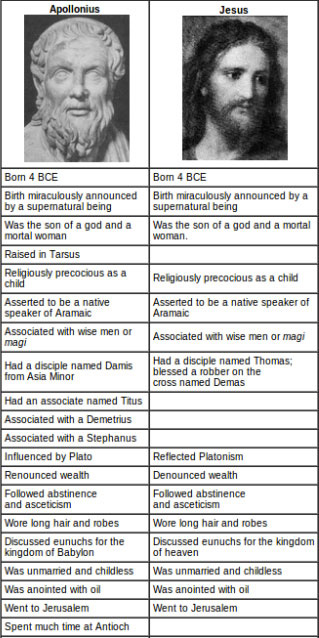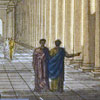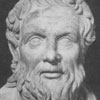Was Jesus Apollonius of Tyana?
 Apollonius of Tyana is said to have been a neo-Pythagorean philosopher, miracle worker, teacher and traveler. Some compare him to Jesus Christ. In fact, many agnostic and atheistic scholars as well as other free thinkers believe that some portions of the Gospels of Jesus Christ are actually modeled on the adventures of Apollonius. Quite possibly, due to the lack of historical evidence for Jesus as depicted in the Gospels – some believe him to have actually been the Jesus Christ. Apollonius of Tyana may have been dropped in favor of Jesus Christ when the Christians decided who to believe was the true son of God. The story is controversial but is it provable?
Apollonius of Tyana is said to have been a neo-Pythagorean philosopher, miracle worker, teacher and traveler. Some compare him to Jesus Christ. In fact, many agnostic and atheistic scholars as well as other free thinkers believe that some portions of the Gospels of Jesus Christ are actually modeled on the adventures of Apollonius. Quite possibly, due to the lack of historical evidence for Jesus as depicted in the Gospels – some believe him to have actually been the Jesus Christ. Apollonius of Tyana may have been dropped in favor of Jesus Christ when the Christians decided who to believe was the true son of God. The story is controversial but is it provable?
The precise birth date of Apollonius of Tyana is unknown. The birth date of Jesus Christ is also unknown historically, but speculated upon. However, it is generally thought that the two lived around the same time. The most common estimates for his birth put it around 15 CE and his death around 100 CE, though some quote his lifespan as “more than 100 years,” which would make those dates inaccurate. Some say he was older than Jesus Christ. The above dates would make him slightly younger than the commonly cited date of Jesus Christ’s birth. There are no contemporary sources for either of their births so historically speaking there is no way of knowing if these estimates are correct. Although for sure it is known that Apollonius of Tyana lived in the first century and Jesus also lived in the same century.
Apollonius of Tyana similarities to Jesus Christ is undeniable. They both are said to have ascended to Heaven. There are stories of both performing miracles. They were both spiritual teachers. They did have identical beliefs. Jesus taught his followers to “…pray not as the heathen do in the synagogues and on the street corners…” per The True Life of Jesus. Apollonius of Tyana believed in a god who was pure intellect and taught his followers that the only way to converse with God was through intellect. He taught that prayers and sacrifice were useless and that God really did not want to converse with men.
Apollonius of Tyana’s name stems from where he was born — Tyana in Cappadocia. That is in modern-day Turkey. It is said that he also traveled to Greece and Syria. Jesus did travel in the Middle East. It is also claimed that he went to India during the years of his life for which the Bible does not account. There is absolutely no mention of Apollonius of Tyana in the stories of Jesus and there is no mention of Jesus in the stories of Apollonius. Could this be due to the fact that Jesus upon surviving the crucifixion did not want to have a repeat of a similar event and therefore disguised himself as Apollonius of Tyana.
Let us now consider some of the essential points of similarity between the biographies of Apollonius and Jesus. Before his birth, the coming of Apollonius was preceded by an Annunciation, his coming being announced to his mother by an Archangel. He was born in the same mysterious manner as Jesus. Like the latter, in his childhood he displayed wonderful precocity in religious matters; then he went through a period of preparation; then came a period of public and positive activity; then a passion; then a kind of resurrection; and finally an ascension.
The messengers of Apollo sang at his birth as the angels did at that of Jesus. He also was exposed to the attacks of enemies, though always engaged in doing good. He similarly went from place to place carrying out the work of reform, being accompanied by his favorite disciples, amongst whom disaffection, discouragement and even treachery made their appearance. And when the hour of danger was at hand, in spite of the prudent advice of friends, and the abandonment of his disciples, he went straight to Rome, where Domitian, the cruel emperor, was seeking to kill him, just as Jesus went up to Jerusalem and to certain death. And before this event, he had been a victim of Domitian’s no less cruel predecessor, Nero, as Jesus had been exposed to the machinations of Herod Antipus. Like Jesus, he is accused of working miracles of mercy by the aid of magic and unlawful arts, whereas he only succeeded in working them because he was a friend of the gods and worthy to be esteemed as such. Like Jesus on the road to Damascus, he fills an avowed enemy with wondering dismay by an apparition several years after his resurrection and ascension. Another remarkable resemblance between Apollonius and Jesus was the great number of cases of evil spirits that were driven out at his bidding. He speaks to them, as it was said of Jesus, with authority. The young man of Athens, who was possessed, through whom the devil uttered cries of fear and rage, and who could not face the look of Apollonius, reminds us of the Gospel narrative of the demoniac of Gadera. Neither was cured until some outward visible circumstance had taken place that gave the people reason to believe that the devil had really gone out. In the one case a herd of swine rushed down into the lake, and in the other a statue falls, overthrown by the violence of the evil spirit as it rushes out of the young man.
Another remarkable resemblance between Apollonius and Jesus was the great number of cases of evil spirits that were driven out at his bidding. He speaks to them, as it was said of Jesus, with authority. The young man of Athens, who was possessed, through whom the devil uttered cries of fear and rage, and who could not face the look of Apollonius, reminds us of the Gospel narrative of the demoniac of Gadera. Neither was cured until some outward visible circumstance had taken place that gave the people reason to believe that the devil had really gone out. In the one case a herd of swine rushed down into the lake, and in the other a statue falls, overthrown by the violence of the evil spirit as it rushes out of the young man.
There is also mentioned in the biography of Apollonius another case of possession singularly like the one of the epileptic child in the three first gospels. In Rome, Apollonius restored a young girl to life under circumstances which immediately remind us of the return to life of the daughter of Jairus. It may be further remarked that both stories are so recorded that a careful critic might ask himself with respect to each whether the young girl who was brought to life again had really been dead after all. The lame, the blind and the halt came in crowds to be healed by the laying on of hands by Iarchus, the chief of the Brahman sages of the Himalayan heights whom Apollonius visited and under whom he studied and derived his knowledge and power.
When it comes to other miracles of Apollonius of Tyana, it is said at the instant the Emperor Domitian was assassinated in Rome, Apollonius spoke of it in a public assembly in Ephesus, and declared the method and manner of his death; which was found to happen at the precise moment of time he spoke of it, and in the exact manner he had described.
Apollonius also had the ability to understand any Language, in his own words…
“And I,” said Apollonious, “my good friend, understand all languages, though I never learnt a single one.
You need not wonder at my knowing all human languages; for, to tell you the truth, I also understand all the secrets of human silence.”
He is said to have understood the language of birds, and conversed with them.
He wrote many books and treatises on a wide variety of subjects during his life, including science, medicine, and philosophy. Most of which were destroyed by early Christians. The Book of Stones is a lengthy analysis of alchemical works attributed to Apollonius by Persian alchemist Jabir ibn Hayyan (ca.721-815). Medieval writer Nicetas tells us of bronze doors at Byzantium which bore inscribed extracts from the Book of Rites, a lost work of Apollonius, and that these doors were melted down in order to destroy so-called non-Christian beliefs which had persisted around the teachings of Apollonius of Tyanna.
According to an account from Philostratus II (170-244 AD – Philostratus II wrote several books on the life of Apollonius), after keeping a vow of silence for 5 years, Apollonius traveled to India in order to “converse with the Brahmins”. During his journey, he attracted a scribe among the people of Ninevah, Damis, who extensively recorded events in the life of Apollonius which described not only events in the life of Apollonius, but events relating to a succession of emperors and the Roman Empire itself. The notes of Damis eventually came into the hands of the empress Julia Domna, who commissioned Philostratus II to use the notes to assemble a biography of Apollonius.
Eunapius, the pupil of Chrysanius, one of the teachers of Julian, writing in the last years of the Fourth Century says that “Apollonius was more than a philosopher; he was a middle term, as it were, between gods and men.”
Roman historian Ammianus Marcellinus (325‑391), who composed a profane history in the Latin language, refers to Apollonius as “that most renowned philosopher,” and thought that, “like Pythagoras and Socrates, he was a privileged mortal who lived assisted by a familiar genius.”
Sidonius Apollinaris, Bishop of Claremont, speaks highly of Apollonius. Sidonius translated the Life of Apollonius to Latin and in writing to a friend he says: “Read the life of a man who religion apart resembles you in many things; a man sought out by the rich, yet who never sought for riches; who loved wisdom and despised gold; a man frugal in the midst of feastings, clad in linen in the midst of those clothed in purple, austere in the midst of luxury . . .In fine, to speak plainly, perchance no historian will find in ancient times a philosopher whose life is equal to that of Apollonius.” (Sidonius Apollinaris, The letters of Sidonius).
As per J.S. Phillimore (Philostratus in Honor of Apollonius of Tyana 1912) Apollonius was the founder of a church and a community, made up of his disciples. It is very possible that these were connected to a branch of the Essene, known as the Nazarenes. Other sources state that there was a group known as the Apolloniei, the adherents of Apollonius, who survived several centuries after his death. Philostratus writes of a temple in Tyana dedicated to Apollonius and founded at the Roman imperial expense, “for the emperors had judged him not unworthy of like honors with themselves” and Maurice Magre ties Apollonius to the Albigensians, a Gnostic Cathar cult who were massacred in 1208 by Pope Innocent III in what was termed the Albigensian Crusade
.
As per G. R. S. Mead : “He attracted to himself many followers and disciples. It would have been interesting if Philostratus had told us more about these ‘Apollonians,’ as they were called, and whether they constituted a distinct school, or whether they were grouped together in communities on the Pythagorean model, or whether they were simply independent students attracted to the most commanding personality of the times in the domain of philosophy.” From Apollonius of Tyana the Philosopher Reformer of the first Century.
As per William Lecky in History of European Morals: From Augustus To Charlemagne, Apollonius of Tyanna “obtained a measure of success second only to that of Christ.”
The original Gospel of Mark may or may not be the work of Marcion. There are strong hypothesis that this Marcion introduced the doctrine that has become Modern Christianity. About 30 years after the death of Apollonius, Marcion went to Antioch, where Apollonius had done a great deal of preaching, and secured a collection of his writings . These he allegedly plagiarized, making the requisite alterations to obscure their actual origins. He took them to Rome, and the rest is History…well a perverse version of it anyhow. See reference here.
 Was Apollonius of Tyana Jesus of Nazareth? Dr. Norman hinted so in a portion of his audio lectures in The Infinite Concept of Cosmic Creation. This was not transcribed into the book form but however can be heard in the audio lectures.
Was Apollonius of Tyana Jesus of Nazareth? Dr. Norman hinted so in a portion of his audio lectures in The Infinite Concept of Cosmic Creation. This was not transcribed into the book form but however can be heard in the audio lectures.
References / Bibliography
Posted in The True Life of Jesus, True History of Manwith comments disabled.






